The graduate student of Man Baojiang studied Konghou. This niche musical instrument only offers majors in three universities in the country, and her Shenyang Conservatory of Music is one of them. She graduated in 2020 and chose to set up a personal studio to recruit students to teach. Because musical instruments are small, some students who graduate from Konghou majors will choose to take the teacher qualification certificate and become music teachers. Man Baojiang made this choice because she accidentally posted a video of Konghou playing on Douyin, which brought her the first batch of students. “This is the basis for my personal studio.”
In pursuit of a better music education market, in the summer of 2021, she moved her studio from Shenyang to Beijing. She transferred the offline students to her senior sister in Shenyang, leaving only the online students. Not wanting to encounter the worsening of the epidemic in Tianjin, people reduced their outing activities, which affected her offline enrollment and teaching. At this time, in addition to the online source of students, Douyin live broadcast rewards constitute another part of her income. “If there is no online course and no live broadcast of Douyin, I will be very anxious.” Every night, she will appear in the Douyin live broadcast room, play Konghou, and share music with everyone.
As a personal worker, Manbaojiang has established a personal brand with higher efficiency and reached potential customers. Many students will watch her live broadcast as one of the ways to judge and choose teachers. Some students told her that they watched her live broadcast before deciding to take a class with her. Different from the meticulous preparation of the concert, the live performance can be seen more in the live interaction, and some songs may pop up quickly after listening to them, which can better show the basic ability of an instrument player.
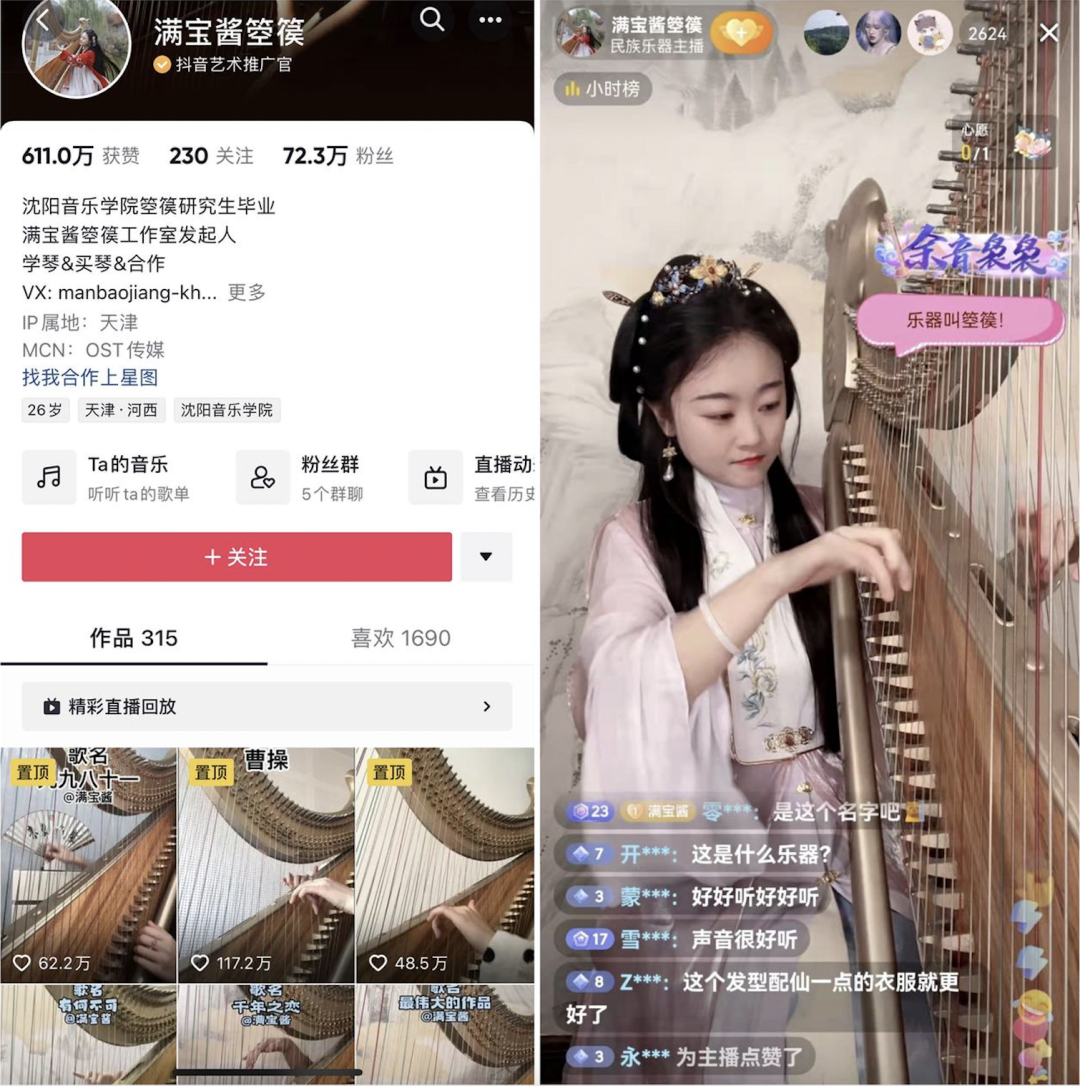
Man Baojiang’s Douyin account
Like Man Baojiang, a group of folk music players met their own audience in the live broadcast room and opened up their own stage. According to Douyin statistics, as of June this year, 87 kinds of ethnic musical instruments have been broadcast on Douyin. The total number of broadcasts exceeded 3.11 million, and the number of viewers exceeded 6.1 billion.
Among them, there are not only the common guzheng and erhu, but also small-scale musical instruments such as Konghou and Sheng, and even the single-stringed qin, which is only circulated among the 30,000-strong minority Jing nationality. This is also a district-level intangible cultural heritage of the local minority autonomous region. Not only the single-stringed qin, but also the Xi’an drum music in the World Intangible Cultural Heritage List, and the provincial intangible cultural heritage suona in Pei County, Jiangsu Province, all broke through geographical and cultural restrictions on Douyin and met a wider audience.
This also shows that these ancient arts themselves have enough charm, they just need the right field to attract the right audience for them. Douyin’s dissemination network can achieve more efficient matching for these niche art categories.
01 When old art meets new audience
After 2004, Bai Xianyong, the son of the famous general Bai Chongxi, created a youth version of “Peony Pavilion” and toured in colleges and universities. This is also the most influential dissemination of Kunqu Opera in 2001, which was listed as “Masterpiece of Oral and Intangible Heritage of Humanity” by UNESCO. Many young people use this play to get into Kunqu Opera. This shows that young people are not unable to resonate with ancient art, but need an opportunity.
Intangible cultural heritage is the memory and continuation of regional civilization, as well as the imprint of cultural community. Only by relying on the inheritance of people can we continue their life. Due to the rapid changes in the social environment, the situation of intangible cultural heritage music is inevitably lonely and the audience shrinks. The youth version of “The Peony Pavilion” is a classic case of dialogue between ancient art and the present. However, this model cannot be promoted. Bai Xianyong has gathered resources from both sides of the Taiwan Strait and three places to create cultural projects. Opportunities are extremely rare.
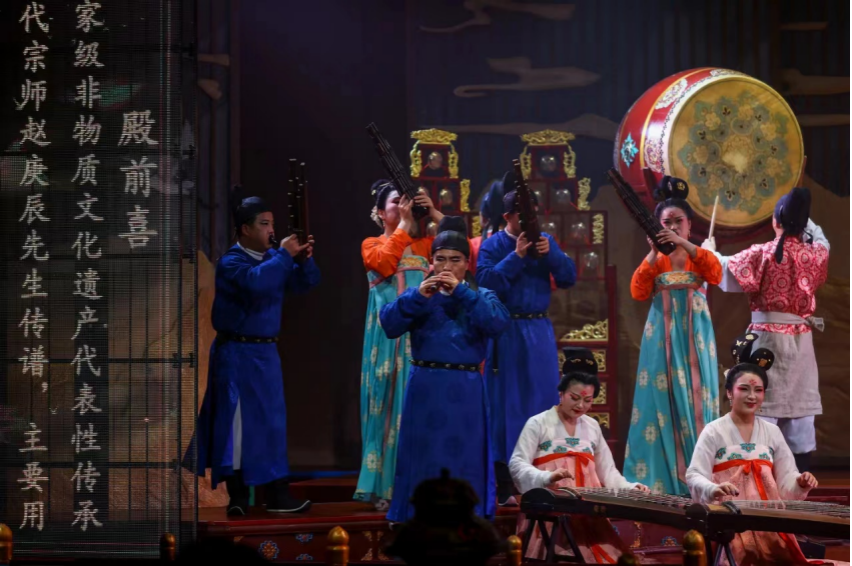
The performance of Dongcang Drum Club The performance of Dongcang Drum Club
Drum music has a history of 1,300 years in Xi’an. Zhao Gengchen, the executive vice president of the local Dongcang Drum Club, is a national intangible inheritor. The daily work of the Drum Music Club is to perform in the Furong Garden in the lobby of the scenic spot. During the epidemic, the current director of the drum music club, Qi Xingfeng, decided to broadcast live on Douyin. Two years ago, out of the consideration of spreading the drum music club, he opened a Douyin account.
During the epidemic, offline performances decreased, which had a greater impact on some niche folk music. In the beginning, live streaming on Douyin was the alternative they were looking for, but when the live room helped them connect to a larger audience, live streaming was not just an alternative without performances, but a new way to distribute music.
The response of the live broadcast was beyond the expectations of the Dongcang Drum Club. On the second day of the live broadcast, the number of simultaneous online users reached 3,800. The one-month live broadcast has brought about a rapid increase in fans. The number of fans has increased from 4,000 to 330,000. The number of live broadcast viewers has exceeded 7 million, and the total reward is 40,000 yuan. Qi Xingfeng used the reward income from the first month to buy more professional lighting equipment and lenses, and also added a host.
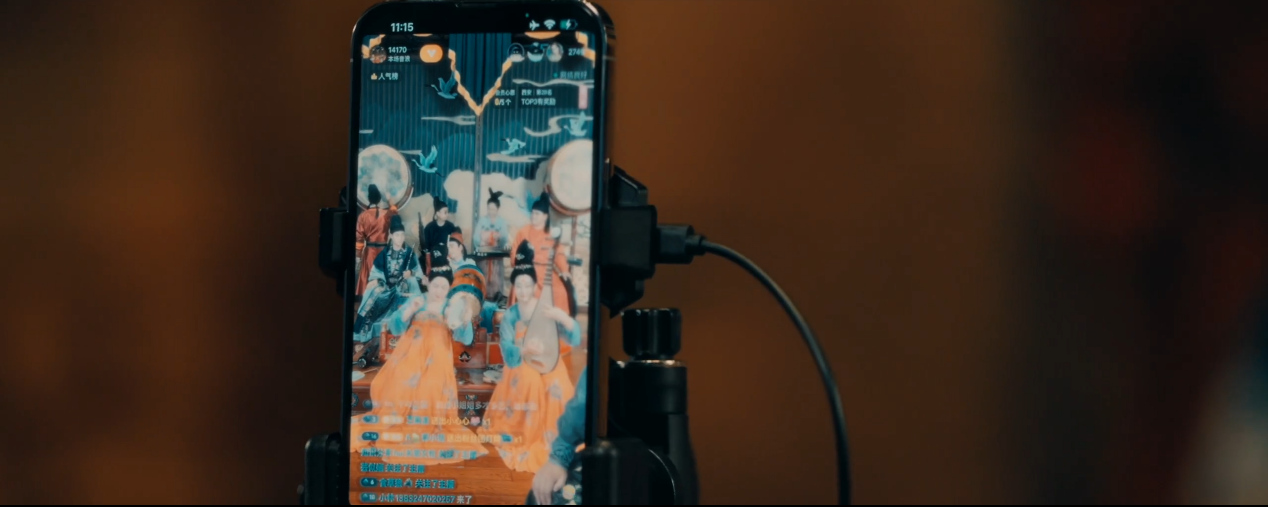
Compared with other communication methods, the live broadcast room is characterized by on-site interaction, which is more relaxed, which also shortens the distance between ancient art and people. Qi Xingfeng said that it is difficult to ask the audience’s feelings for performances, but in the live broadcast room, he can directly interact with the attention through messages. Liu Yahong, a member of the drum music club, also felt that he enjoys the joy of “playing instruments” with his colleagues in the live broadcast room. Actors gather in front of the camera to perform. Compared with the usual formal performances, there will be room for improvisation.
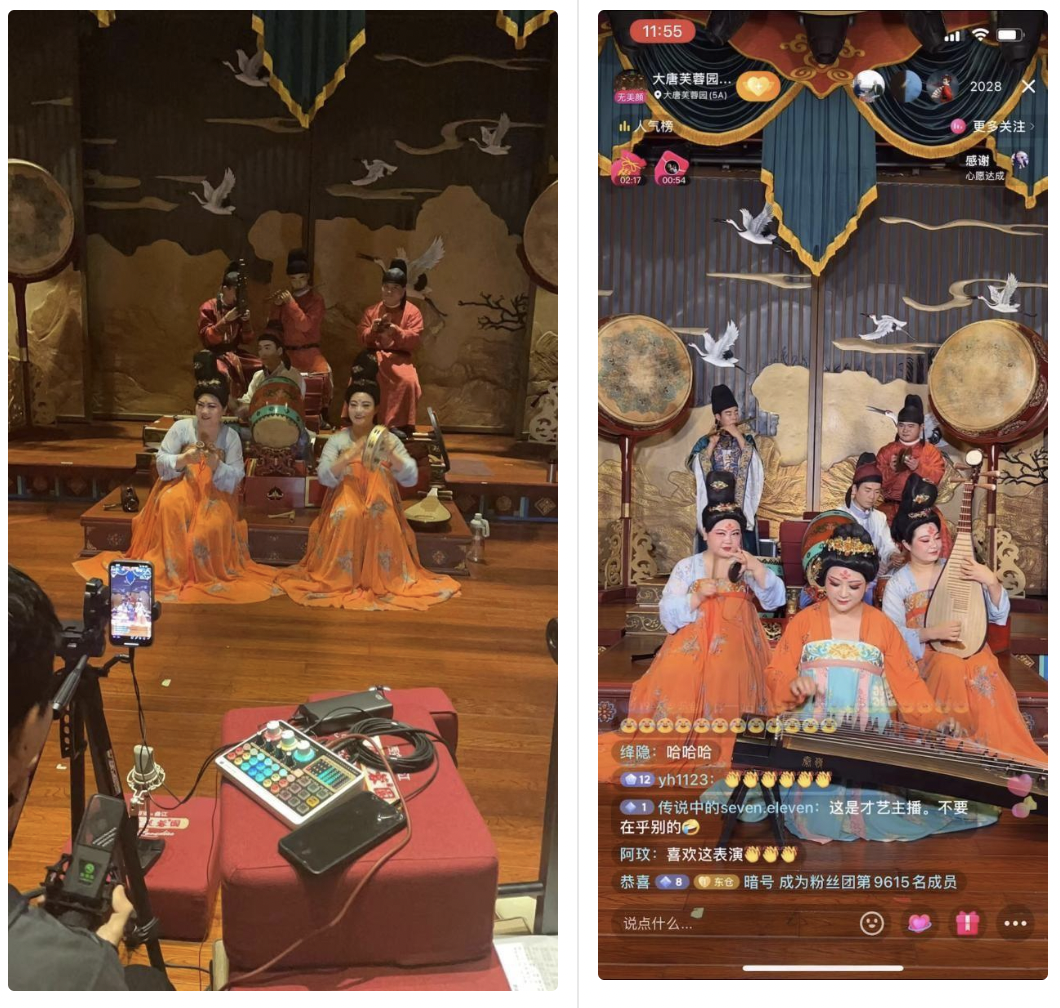
Dongcang Drum Music Club live broadcast
Many intangible cultural heritage arts, traditional folk music, opera, etc., are close to life, such as suona, which is part of weddings, funerals, and marriages. However, after the cultural context changes, the chance of natural transmission in life decreases, and it is necessary to recreate the communication field. Live interaction gives them a new channel of communication.
Lin Ling, an associate researcher at the China Research Institute of Fudan University, said, “In traditional opera culture, the interaction between the stage and the stage is particularly important. The act of rewarding is a kind of benign interaction, similar to the cheers in the theater. It is regarded as an attempt by the audience to expand their own voice, so as to increase their sense of participation. For the live broadcast room of opera, the user’s reward is the love and encouragement of the content of the performer, which can further stimulate their desire to create. and the desire to share, and ultimately improve the quality and efficiency of opera dissemination.”
Not only opera, but also folk music. The suona artist Cao Ga, who is live on Douyin, has the deepest experience of the communication effect brought by the live broadcast. He is a member of the Cao family in Peixian County, Xuzhou. Since March this year, Suona Cao Jiaban has performed live broadcasts continuously at a frequency of one to two times a day, and each performance of two to three hours. It already has 670,000 followers.
“It seems that the traditional musical instrument suona has also become fashionable through the expression of live broadcast. Now many people on the Internet imitate our suona… I even saw some foreigners imitating it. This is really better than getting a reward income. It makes me even more excited. Only by being known and liked by more people, especially young people, can suona continue to be passed down.”
02 When live broadcast becomes a new carrier
The promotion of Douyin for cultural anchors has become more and more obvious in the past two years. In 2021, the “DOU Art Plan” was launched, and it specifically focused on art categories such as intangible cultural heritage, opera, and folk music. It continued to promote the “broad spectrum” of content.
As of June 10, 2021, Douyin covers 97.94% of national intangible cultural heritage projects. The number of live broadcasts by the creators of the intangible cultural heritage items has exceeded 20,000. In April of this year, Douyin Live launched “DOU has a good show”. In the next year, it will help at least 10 troupes and 1,000 professional opera actors to build the second online theater. Recently, Douyin, together with the Central Chinese Orchestra, launched the “DOU National Music” program. The Central Chinese Orchestra will have more than 100 artists stationed in Douyin and start broadcasting; in the next year, Douyin also plans to help 1,000 folk music performers earn more than 10,000 yuan per month, and allow 100 non-genetic inheritors of folk music to get the benefits of the broadcast.

Cao Jiaban performed at the “DOU National Music” press conference
It has already happened to some folk music anchors that the monthly income exceeds 10,000 yuan through a new income channel. For niche orchestras that do not have easy access to continuous and stable performance opportunities, live streaming has become their most stable way to perform. When you no longer consider the limitation of finding an offline performance venue, as long as you have a simple space and set up equipment, you can have a stage; more importantly, you can get your own audience through such a stage.
Founded in 2008, the Beijing Shanshui Folk Music Troupe is mainly composed of people with disabilities. Although they have participated in national professional stages and TV competitions for many times, they have also encountered difficulties twice in the past ten years due to the scarcity of performance opportunities. At that time, there was only 1,000 yuan in wages per day per month. Head Liu Jidong introduced that in March 2021, they will conduct live streaming on Douyin as an “orchestral reform”: “From 2021 to now, we have broadcast live every day, exceeding the frequency of offline performances during the peak period in 2019. We rely on team wages. With personal live broadcast, the monthly income of the members can exceed 10,000 yuan, and the music dream and life can be continued.”
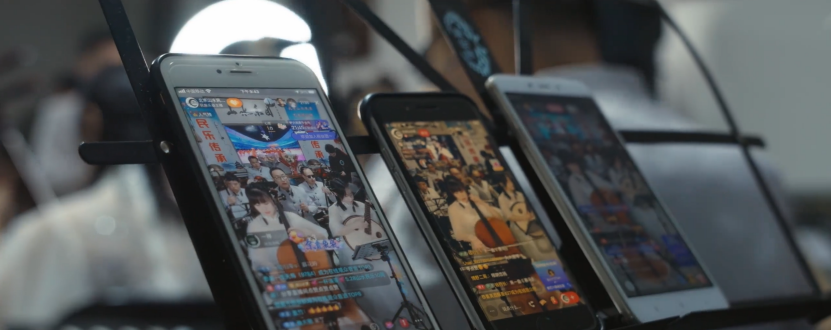
Rewarding is a way of realizing talent. According to Douyin’s public data, 87% of the live broadcast folk music anchors have received reward income. In the future, Douyin will help folk music anchors better integrate into the live broadcast ecosystem through traffic support, cooperation in professional fields, and professional operations. In terms of traffic support, the first phase plans to invest more than 100 million traffic to help the anchors grow; in terms of professional cooperation, the “Le Shang Hua Huo – Chinese Music Conference” and the official account @DOU Lai Zai Le Bar will be regularly launched to allow experts and professionals Players and ordinary fans have more online and offline communication and interaction; in terms of operation, in addition to the guidance and training of live broadcast skills, Douyin will help the folk music industry to diversify its operations and enable paid performances.
When a platform is large enough, more consideration will be given to its role in the social ecology. Douyin’s diverse display of traditional culture is also an expansion of this national-level application’s role.
Man Baojiang’s teacher is almost 70 years old. At first, she didn’t understand what she was doing on Douyin. She just watched her playing with her mobile phone and worried that she would lose her mind. Gradually, someone asked him while chatting: Is Manbaojiang your student? “Not only people from Shenyang, but people from all over the country will ask him when they call.” The teacher realized that Douyin is a platform that can spread the musical instrument like Konghou, and said to her, “Work hard and keep doing it.” . Spread her favorite musical instruments and fill her with joy. “If I didn’t get in touch with Konghou, maybe the work I did would not make me feel so satisfied and happy now. I really like my luck now, I don’t regret it at all, I think my current job is what I want to do. to do.”
This article is reproduced from: https://www.geekpark.net/news/307111
This site is for inclusion only, and the copyright belongs to the original author.